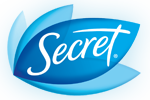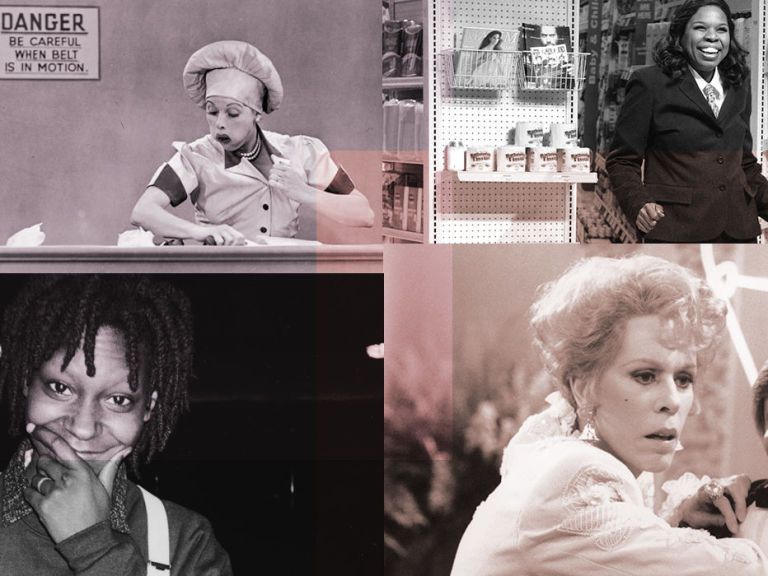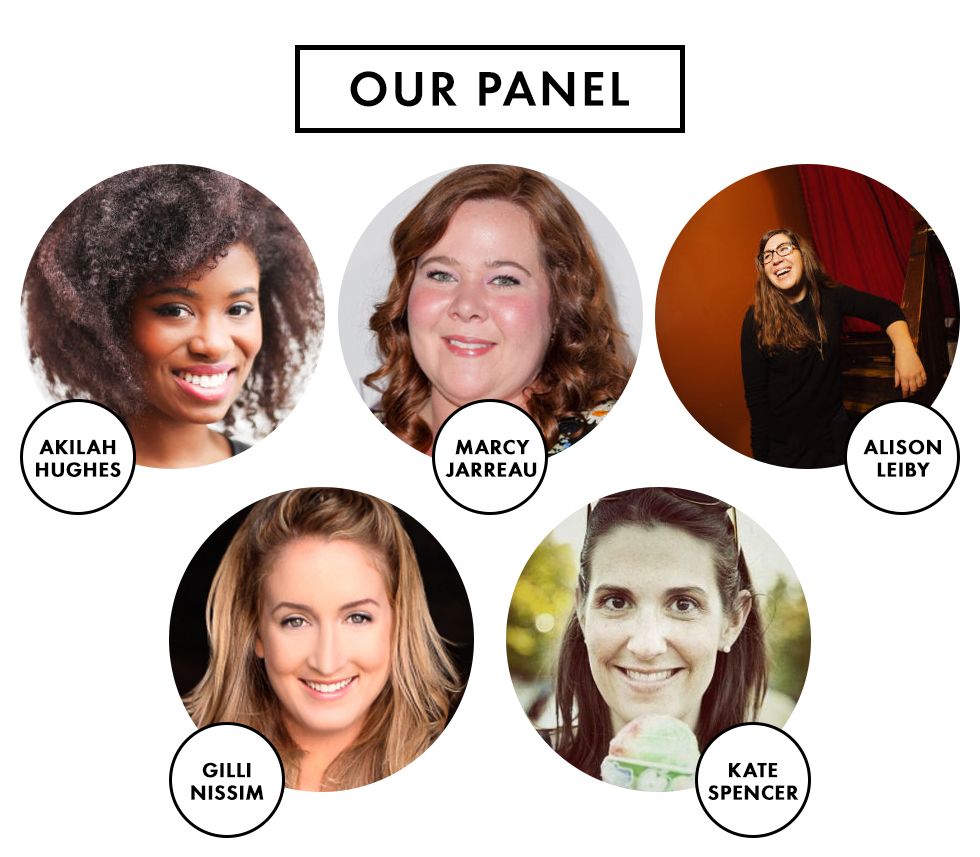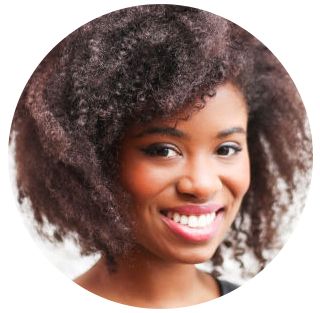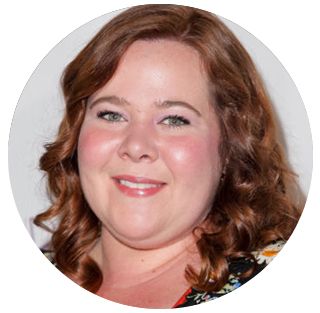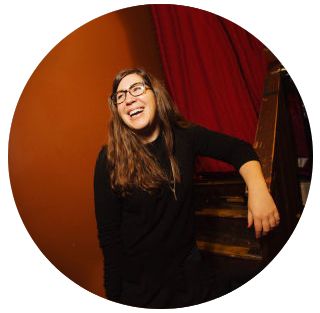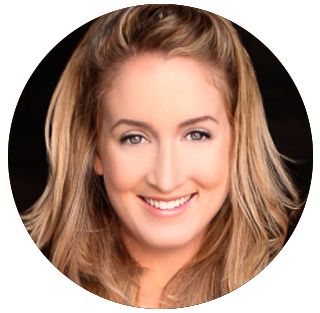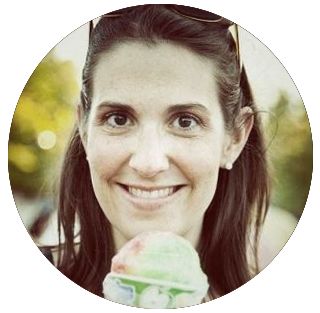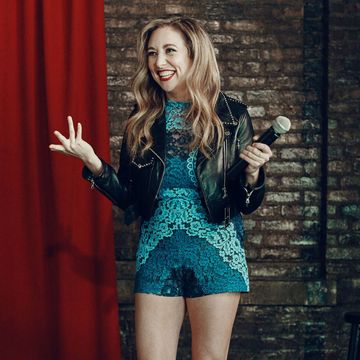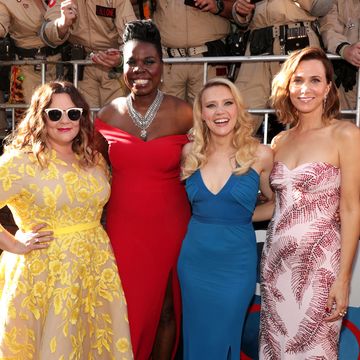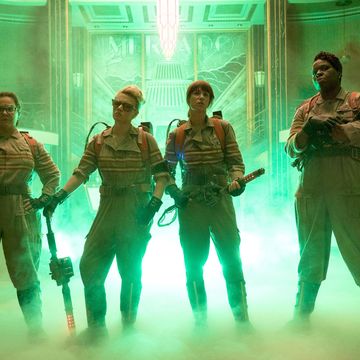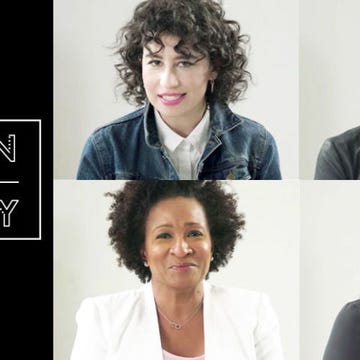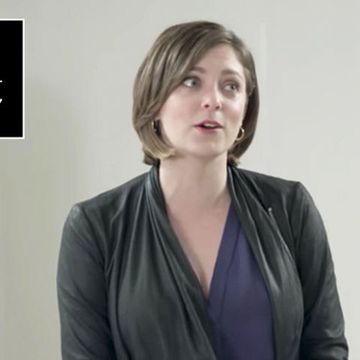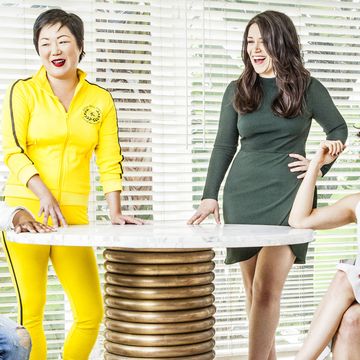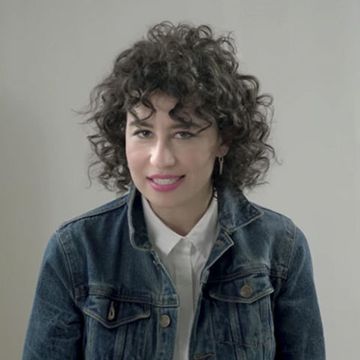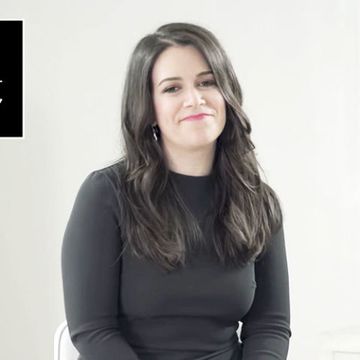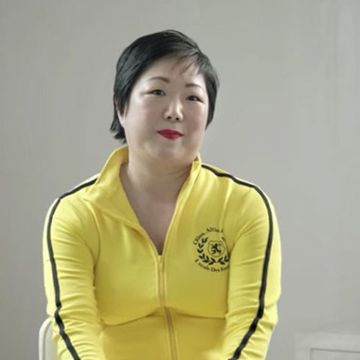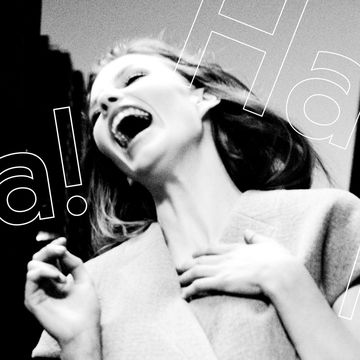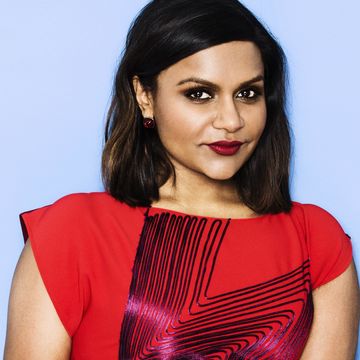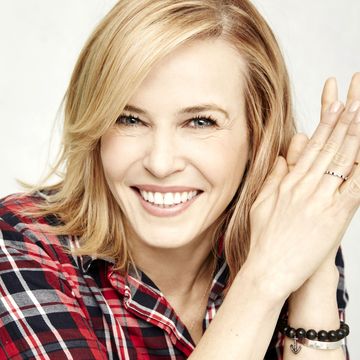Every comic has had that kill-me-now moment, but there are ways to cope. Here, the good, the bad, and the funny, presented by the stress- and sweat-fighting powers of Secret.
There's nothing funny about being embarrassed, unless, of course, you're a comedian. But when so much of comedy has to do with embracing humiliation, what happens when you're up there and, suddenly, the joke's on you? Is it best to pretend like nothing's happening, dig deeper into the offending joke, or directly address the crowd?
To find out what works and what might just get you booed, we asked a few of our favorite funny women how they deal with cheek-burning moments on stage.
What's the first joke you ever told that completely bombed?
Marcy: This is hard because anytime stuff happens on stage that doesn't work, I get to pretend like it didn't happen and move on because it's improv. Once in a scene I said that I was in a support group for people who were victims of infanticide, and the audience booed. I stood up and said, "I didn't kill the baby. It's just dead." You don't boo me! I decided a few years ago that I don't get embarrassed. I just get angry.
Alison: Early on, I had this joke where I said, "Oh, I'm on this wedding diet. It's where I don't eat until someone wants to marry me." Which, 98 percent of the time gets a great response. But two percent of the time–including once, very early on–it just was met with bad groans. It was probably me telling it without the confidence that I now have. I just sounded sad about being single.
Akilah: When you do stand-up, there'll either be a clock or somebody with a light to tell you that you have a minute left. If you've been telling a story for a while and there's no laughter and then the light comes on–oh man, you're not going to win people back at that point.
Gilli: "I'm a really self-confident person. It's not that I think my sh*t doesn't stink, I think it smells like something I wouldn't mind eating." That's definitely my first joke that bombed. I was really crushing the rest of the show, and then when I came on that joke, it was a great reminder that, oh, you have to try. There are no free passes when it comes to comedy. The audience came for one thing and one thing only, and that's to laugh.
Are there any specific no-nos when it comes to comedy?
Gilli: You know the golden rule of movies? You can kill a human nine ways to Sunday, but you cannot kill a dog. No one wants to hear about anything bad happening to a dog.
Alison: To me, there's nothing worse than pity from an audience. You just have no power or control. They're just like, "Aw, sad lady." That's my nightmare. In my regular life, with my friends, I'll be like, "That was fun. I'm going to die alone." Just little lines like that, where it's like, "I haven't eaten in six weeks," which everybody is like, "That's obviously a lie. I'm looking at you." That totally works when I am talking to my friends.
How can you tell things are going south? Is there a surefire sign it's just not working?
Marcy: You just embrace it! I teach at UCB LA, and I always say to my students, "If you feel stupid, it's just because you're not committing hard enough." It's made me a bit of a monster though, because if someone doesn't like something, then I lean into it a little bit harder.
Gilli: If there's even a glimmer of falling apart, you falter and you're torn apart. With improv, you can change course, but with stand-up, you need a plan. You sat down and made that plan, and you've got to stick with it even though there's unexpected turbulence along the way.
Kate: There's a silence that is the audience grimacing. I don't know how to explain it, but you can sense the cringe-y energy of an audience. I recently used the word "bitch" on stage referring to a female character in Star Wars, which is terrible. I was horrified that I did it. I think I was trying to be sassy, but it didn't land. I could feel the audience judging me, and I was like "I'm a good feminist, I swear," but it didn't come across that way.
Is there a way to turn it around? How do you win an audience back?
Alison: Yeah, because I do a lot of self-deprecating stuff, but I'm always like, "Yeah, but obviously I'm obsessed with myself and think I'm amazing, or else I wouldn't be on stage talking to you." Those jokes are fun but they can be read so wrong. I haven't found a way to turn it around, and if someone has one, I would love to know what it is. I usually just sit at the bottom of that hole and just keep digging. I'm like, let's really just go for it. "You guys want to hear some period jokes?"
Akilah: Everyone will tell you to do crowd work. If your A-material is just sucky, just start asking somebody in the front row about their lives and start making fun of them. For some reason that's very successful, and I think it's because everybody hates everybody.
Kate: With improvisation, you're digging a hole because the second you know that they're not on your side, you try to make them like you. And it backfires. A lot of times in improvisation when people panic, they go blue. They try to get a laugh by being really sexual or gross or offensive. The audience already hates you, so it makes matters worse. One way to turn it around is acknowledging that you're in on the joke. When you're storytelling, you've had time to reflect on it: You're both the storyteller and a member of the audience.
Gilli: Those stinky joke moments beget the best improvised line. That's why people get up and try the same joke again and again. It might kill! I used to run lights at a comedy theater in Santa Monica, and I would watch comics do the exact same five minutes to one crowd and kill, then the next night, the same exact five minutes and crickets. You wanted to yank them off the stage with a cane.
Some people love to blame the audience, which is a pet-peeve of mine. I think in that moment, you double down. You do whatever it takes. If it's physically flailing around, making a funny face, doing a weird voice, whatever it takes in that moment to just remind them that you're here for them.
When do you know you're a total goner?
Gilli: When you start to joke around in improv, it goes south quickly. You're worrying about your own glory, and you're immediately punished for that. When you work as a team, when you work as part of that group, and you're stoking the flames, then you've got a wonderful bonfire of joy. But the moment you try to go off by yourself and showboat, or make a joke for the joke's sake, you are quickly punished–both by your team and by the audience.
Aside from jokes gone wrong, have you ever experienced any other onstage gaffes?
Alison: I am by nature a very sweaty person, so there have totally been shows where maybe I wasn't planning on going or just misjudged how hot it was–but I'm wearing a gray t-shirt. I'll sweat right through that. The stage is super hot usually because you're under those lights. If it's really bad, I'll address it. Especially shows in the summer in back rooms of bars, and I'm just drenched in sweat. I'm like, "God, I'm so happy we got to do this comedy show in a sauna. Crank up the heat in this bar. Let's all be disgusting."
Akilah: One time a friend of mine asked me to be in her show, she just sort of sprung it on me. I didn't realize immediately, but someone later pointed out that like I was wearing these jeggings where you could see my underwear through them. "I wasn't even planning on being on stage today, and now, I'm, like, naked. Damn, why do I even own jeggings?" It causes you to reflect on your whole life.
Has there has ever been a time when you were specifically uncomfortable being a woman in comedy? Have you ever had to tell someone off?
Alison: It can feel like you're constantly reminded that you're a woman every time you do comedy, but I had one experience that stands out. I was doing a charity show and was the only woman on the lineup. When the host introduced me, the guy producing the show got on the stage and sat right behind me and was staring at my ass. I turned around and asked him, "What are you doing?" and he said, "Just taking in the view, sweet cheeks. Best seat in the house!" I told him to get off the stage and he did and I did my set. Afterwards he was like, "That was a pretty funny bit we did up there together!" I told him, "That wasn't a bit, you interrupted me doing my job to hit on me. Never do that again." He looked pretty shocked that I said that. He was a real nightmare.
Gilli: Women have been underrepresented for so long that now that there are more women and people of diverse backgrounds hitting the scene and therefore more new perspectives, we're all kind of tired of stuff that might have worked 10 years ago like misogyny, racism, or homophobia. It sounds crazy to say those very loaded words, but if you go to some open mics, that's what you'd hear.
I've hosted open mics and other shows for years now. When you're the host, you are the captain; you're in charge. There have been countless times when a male comic has commented on my looks [in their acts], some even said super vulgar things. Then I have to shake their hand and take the stage back. When I treat them with respect and then am met with that, it's mind boggling. "I'm trying to run this show, dude!" You're stuck in the past where you could get applause by saying stuff like that to a room with other straight white men like yourself. Well, look around the room, bro. There are all kinds of people here, so what else you got? I'm so lucky I live in a world where I am allowed to be outraged by that. In that moment, I tell the guy off by getting a laugh. You bombed, and I'm up here cleaning up your mess, and we're all too busy laughing to think about you and your stale material.
How much of comedy comes from embarrassment?
Marcy: Every moment of embarrassment is a good opportunity. It's nice to look back and to take control over it, even by making another character experience it. Oh god, once, in college, I peed on myself twice in 20 minutes. It was in the middle of the day; I wasn't even drunk. It was just from laughing too hard. That's one of my favorite stories to bring out whenever people start to tell stories from the times they peed on themselves. I'm like, "I can beat you." Did it in the cafeteria, and then again in the elevator on the way home.
I think some of the most fun and honest moments are those that make us want to die a little. As a comedian, those are some of the most powerful ones because as you are retelling them, you hear everyone laughing because they know. Everyone has experienced this stuff; we've all been there. We've all had something terrible happen. And if not, it's great to win. "Mine was the worst, wasn't it?"
Alison: At the end of the day, it's just vulnerability. I like seeing that from people: You're a real person who has real experiences that make you feel the way the rest of us feel. I love hearing a good embarrassing story; I grew up during the heyday of teen magazines having the embarrassing stories at the end. That's what I loved.
Kate: When I taught improv, I probably saw the scene of a person getting her period in public for the first time a hundred times. It's relatable, and it's a go-to because it's sympathetic. People are going to be able to connect with those moments.
Akilah: I don't even think comedy would exist if we weren't laughing at ourselves for all the stupid things we do. My favorite kind of comedy is self-deprecating because I think a lot of times people are afraid to go after themselves for doing something embarrassing, but it's cathartic to watch somebody else do it. You're like, "Oh, god, it wasn't that bad."
About our panel:
Akilah Hughes
Akilah Hughes is a comedian (stand up, sketch, improv, writer, YouTuber, etc.) originally from Cincinnati (who dey?!), who is now hanging out in Brooklyn, NY. She trained in sketch and improv at the Upright Citizens Brigade, and writes for Fusion, HelloGiggles, Femsplain, and Refinery29.
Marcy Jarreau
Marcy Jarreau is a member of the house team 'Search History' at the Upright Citizens Brigade in Los Angeles. Marcy's credits include Comedy Bang! Bang!(IFC), The Birthday Boys(IFC), Adam Ruins Everything(TruTV),The To Do List,and the upcoming filmThe Last Word. She also wrote, starred in, and produced the award-winning short film Relationship Goals, currently streaming online.
Alison Leiby
Alison Leiby is a New York-based comedian and writer whose work has appeared in The New York Times, McSweeney's, and more. She hosts the popular comedy storytelling show "It's a Long Story" at UCBeast.
Gilli Nissim
Gilli Nissim is a Upright Citizens Brigade weekend team improviser, host, and sketch actor by night, and a writer/director at Funny or Die by day. She has ghostwritten for famous YouTube personalities, and has written for popular web series including Honest Trailers and Screen Junkies. As an actor, she's appeared on several shows for Adult Swim including Childrens Hospital, NTSF:SD:SUV::, and the upcoming The Hindenburg Explodes.
Kate Spencer
Kate Spencer is a comedian, writer, and mom who was a senior producer, writer, and on-air host at VH1 for 7 years, covering all things pop culture and entertainment. She's also a regular performer at the Upright Citizens Brigade in Los Angeles, and was named one of The Funniest Women To Follow On Twitter by The Huffington Post. Her writing can be found on Rolling Stone, Buzzfeed, Mommyish, and Modern Loss, among many other places.
